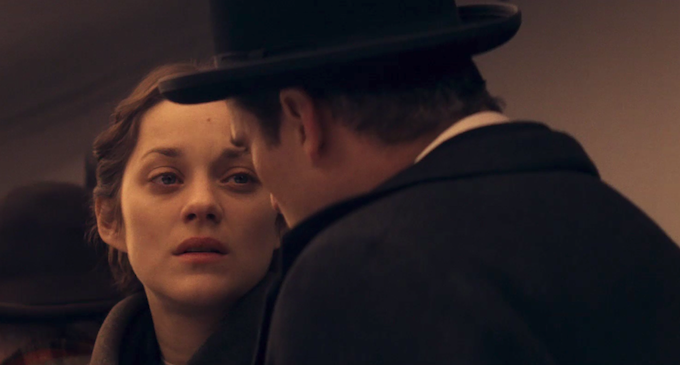 There are only a few days left of the 2013 Cannes Film Festival, but some of the biggest films are still yet to come. Tomorrow brings Alexander Payne‘s “Nebraska,” while Saturday includes both Roman Polanski‘s “Venus In Fur” and Jim Jarmusch‘s “Only Lovers Left Alive.” And as for Friday? Well, Friday brings the return of one of Cannes’ favorite filmmakers, James Gray, back with his first film since 2008’s “Two Lovers” with “The Immigrant.”
There are only a few days left of the 2013 Cannes Film Festival, but some of the biggest films are still yet to come. Tomorrow brings Alexander Payne‘s “Nebraska,” while Saturday includes both Roman Polanski‘s “Venus In Fur” and Jim Jarmusch‘s “Only Lovers Left Alive.” And as for Friday? Well, Friday brings the return of one of Cannes’ favorite filmmakers, James Gray, back with his first film since 2008’s “Two Lovers” with “The Immigrant.”
We got our first brief glimpse of the period piece earlier in the week, and now a new, longer clip has arrived. It still features Marion Cotillard‘s refugee, Ewa, but rather than Jeremy Renner‘s magician, Orlando, she’s paired up with Joaquin Phoenix‘s Bruno, Orlando’s cousin, a seemingly friendly man who actually pushes her into prostitution. Even more so than the last, this establishes some stunning production design, and a gorgeous-sepia toned look, courtesy of DoP Darius Khondji. In general, it just makes us wish it were Friday already.
In the meantime, Gray’s given his first quotes about the film in the press notes. To help tide you over, five key highlights are below.
On the personal nature of the film:
“My grandparents came over from Russia or Ukraine depending on what era you’re talking about, from Ostropol, a town not too far from Kiev. My grandmother’s parents were murdered during a pogrom by White Army troops. And in 1923, my grandpa and grandma came to the United States by way of Ellis Island. Of course, I heard many stories about Ellis Island and I became somewhat obsessed with it. The first time I went, in 1988, was before they had restored the island: it was almost as if it was frozen in time. It was haunting, with half-filled immigration forms on the floor… To me it seemed that it was filled with ghosts, the ghosts of my whole family. So I had wanted to make a picture that sprang from that.”
On the influences:
“I thought of Robert Bresson and ‘Diary Of A Country Priest’, particularly for the confession scene. I wanted something austere and mythic. But the film was never meant only to be an homage to Bresson. It was also partly inspired by the traditions of opera and melodrama. Through outsized emotions and dramatic situations, there is a greater truth if you will. This is why the film is scored with Puccini, Gounod and Wagner.”
On Casting Marion Cotillard:
“The big challenge obviously was her Polish, which turned out to be fantastic. One day, I asked the actress who plays her aunt what she thought of Marion’s Polish. She said it was excellent but she had a slight German accent. I confronted Marion and she said: “I know, my character is from Silesia, which is between Germany and Poland, I’m doing it on purpose.” That’s how precise she is! It knocked me out.”
On recreating Ellis Island in the film:
“I was shocked when I found out that there had never been a movie made in Ellis Island for what it was, an immigration center. A handful of pictures have been shot there since its restoration, but they didn’t recreate the old Ellis Island. Kazan recreated it for AMERICA, AMERICA, as did Coppola for ‘The Godfather Part II’, but neither of those directors had the opportunity to shoot in Ellis Island. So I had what I felt was a pretty unique opportunity, and tried to make it as accurate as possible. I read many books, and of course looked through tons of photographs and my whole family’s paperwork. When I went to Ellis Island with my grandfather, there was a woman on the tour with us who was crying. She didn’t speak much English but my grandfather spoke with her, and apparently she and her sister had been separated there. I thought that was a good premise for a story.”
On the look of the film:
“I worked very well with Darius, who is a man of great sensitivity. He was my brother for a year. We took trips to museums, we looked at paintings and also at autochromes – color photographs from the early 20th century. We also looked at Polaroids from the 1960s by the architect and designer Carlo Mollino: they are the closest thing achieved by modern technology to the autochromes in terms of the color saturation and the density of blacks. Darius and I just talked a lot about color and the frame itself, what part of the set would be lit and why. My other films were meant to be naturalistic. You could always sense where the light was coming from. I abandoned that because I wanted to tell a fable.”

